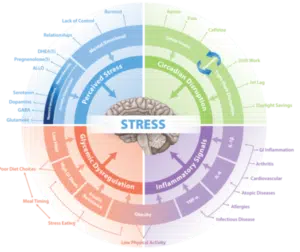1. Balanced Nutrition and Diet

2. Regular Physical Activity
Consistent physical activity is crucial for a healthy lifestyle. It improves cardiovascular health, strengthens muscles and bones, boosts mood, and manages weight. Aim for 150 minutes of moderate-intensity aerobic exercises or 75 minutes of vigorous-intensity exercises each week and muscle-strengthening exercises twice weekly.
Choose activities you enjoy making exercise sustainable. Incorporate movement activities into daily life by taking the stairs, walking or biking, stretching regularly, and doing household chores. A strength workout is also vital for building muscle mass and increasing metabolism.
Rest and recovery are essential, so allow time between exercise sessions and prioritize sufficient sleep. By prioritizing physical activity, you can improve fitness, improve energy, and lessen the risk of chronic diseases. Find enjoyment in exercise, stay active throughout the day, and make it a sustainable part of your routine.

3. Sleep and Rest Enough
4. Stress Management
By prioritizing stress management, we can minimize its negative impact. Recognize and manage stress triggers, practice relaxation techniques, manage time effectively, and seek support. Remember, self-care is essential for a balanced life.
Effectively managing stress is crucial for maintaining a healthy lifestyle. Here are key strategies:
Recognizing and managing stress triggers: Identify the factors contributing to stress and develop strategies to minimize their impact.
- Relaxation techniques: Practice meditation, deep breathing, and yoga to promote relaxation and calm the mind.
- Time management and prioritization: Manage time effectively, prioritize tasks, and create a realistic schedule that includes breaks and self-care activities.
Reach out to friends, family, or professionals for guidance and coping strategies. Talking to someone and seeking professional help can provide valuable support.
5. Maintain Mental and Emotional Wellbeing
Prioritizing mental and emotional well-being is essential as they are prominent factors when it comes to living a healthy lifestyle. If you start ignoring yourself and do not care for your emotional and psychological health, you cannot live your life fully.
Here are some important strategies you can adopt to stay emotionally and mentally strong and enjoy your life to the maximum:
- Always ensure you get enough sleep, eat nutritious meals, exercise regularly, and make time for relaxation and personal interests.
- Practicing gratitude and positive thinking: Foster a positive mindset by expressing gratitude for what you have and concentrating on the constructive aspects of your life. This can reduce stress and enhance mental well-being.
- Dedicate time to activities you enjoy, whether it’s pursuing hobbies, spending time in nature, reading, or engaging in creative pursuits. These activities bring fulfillment and boost emotional well-being.
- If you’re struggling with mental health challenges, access to a doctor who can offer guidance, support, and appropriate treatment.
By incorporating these practices, you can nurture your mental and emotional well-being. Prioritize self-care, cultivate gratitude, engage in joyful activities, and seek help when needed. Remember, caring for mental health is as important as caring for your body.
6. Avoiding Harmful Substances
You can significantly improve their health and well-being by avoiding harmful substances. Smoking and tobacco cessation are crucial to reducing the risk of various health conditions, and quitting smoking can be achieved with the help of support and resources available.
Limiting alcohol consumption promotes better liver function and overall health while avoiding illicit drugs helps maintain physical and mental well-being and prevents legal complications.
Additionally, being cautious with medication and prescription drug use ensures safe and responsible healthcare practices. It is essential to follow prescribed instructions, understands potential side effects, and consult healthcare professionals when needed.
7. Regular Health Check-ups
Regular health check-ups are vital for maintaining optimal well-being. They help identify potential health issues early on, increasing treatment success and reducing complications. Visiting a primary care physician yearly allows for comprehensive evaluations, while consulting specialists based on age, gender, and health history ensures targeted screenings.
Following recommended guidelines for blood pressure, cholesterol, and cancer screenings aids in early detection and intervention. Vaccinations protect against infectious diseases and promote community health. Being proactive in addressing health concerns by discussing symptoms with healthcare providers enables timely diagnosis and treatment.
Monitoring changes in the body, mood, and well-being is essential for maintaining good health. So, prioritizing regular check-ups and preventive care empowers individuals to take control of their health, fostering a healthier and happier life.

8. Maintaining a Healthy Weight
Upholding a healthy weight is key for overall well-being. It begins with understanding body mass index (BMI) as a tool to assess weight and health. Setting realistic weight goals is important to avoid unrealistic expectations.
Healthy approaches to weight management involve adopting a balanced diet, regular physical activity, and portion control. Eating whole foods and finding an enjoyable exercise routine are vital factors in sustaining a healthy weight.
Avoiding crash diets or extreme measures is essential as they can harm health and lead to short-term results. Instead, focus on sustainable lifestyle changes that promote long-term weight management. Dedication, patience, and consistency are necessary to maintain a healthy weight.
9. Hygiene and Cleanliness
Maintaining hygiene and cleanliness is another vital factor for a healthy lifestyle. Regular handwashing prevents the spread of germs, while proper dental hygiene safeguards oral health. Personal hygiene practices, such as bathing, washing clothes, and grooming, ensure cleanliness in daily routines.
Clean hands, healthy teeth, and overall personal cleanliness reduce the risk of illnesses and promote a fresh and hygienic lifestyle. Regular handwashing, dental care, bathing, and environmental cleanliness should be integrated into our daily routines to maintain hygiene consistently.
By doing so, we improve our health and create a cleaner and improved environment for ourselves and those around us. Prioritizing hygiene and cleanliness leads to a more enjoyable and wholesome life.

10. Adopting a Flexible and Balanced Lifestyle
A flexible and balanced lifestyle is crucial for well-being and a fulfilling life. It involves finding harmony between work, relationships, personal growth, and leisure. Time management is essential, prioritizing tasks and creating space for responsibilities and leisure.
Upholding a healthy work-life balance is key, as setting boundaries ensures rest and personal activities are not overshadowed. Self-care plays a vital role in practicing self-compassion, prioritizing physical and mental health, and nurturing oneself emotionally.
Flexibility allows for adaptability and openness to new opportunities. Mindful choices in nutrition and physical activity contribute to overall health. Therefore, cultivate a flexible and balanced lifestyle to navigate challenges, increase resilience, and enjoy a fulfilling life.
Conclusion
Adopting a healthy lifestyle through balanced nutrition, regular exercise, quality sleep, stress management, and social connections is vital for our well-being. Prioritizing mental health, avoiding harmful substances, maintaining a healthy weight, and practicing sun protection and hygiene are essential. Consistency, flexibility, and professional guidance play key roles in sustaining long-term habits.
Following these guidelines can enhance your overall health, vitality, and well-being. Every small step towards a healthy lifestyle matter, leading to immeasurable benefits. Let’s prioritize our health and embark on a journey to a healthier, happier future.

Sam Warne
Related posts

The External Forces Against Your Health – 4 Action Steps To Be Healthier Than Ever






